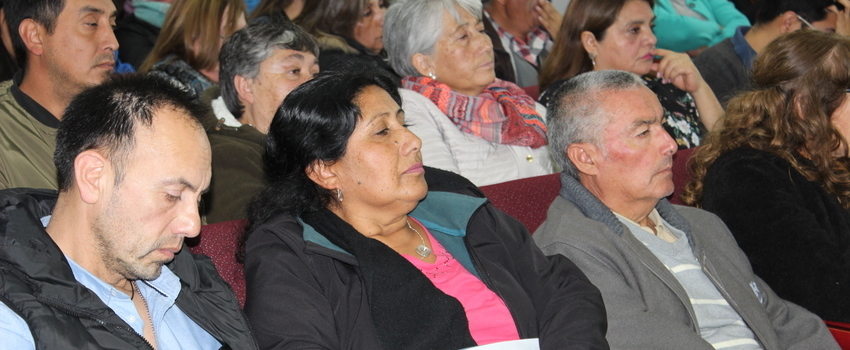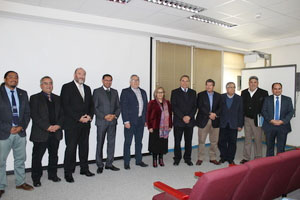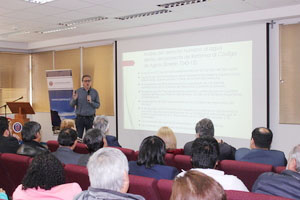- News
ULS receives leaders of rural drinking water committees to talk about human rights to the vital resource

The seminar sought to explain what the fundamental rights of water are and allowed a direct dialogue with key actors in the rural sector of the Coquimbo Region.
With the presence of Senator Adriana Muñoz, the Rector of the University of La Serena, Dr. Nibaldo Avilés, the former Director General of Water, Carlos Estévez, the Executive Director of the Sustainable Chile Program, Sara Larraín Ruiz-Tagle, the leader of the National Federation of Rural Drinking Water, Marcos Landeros, university authorities, neighborhood leaders and water associations of the Coquimbo Region, students and guests, the Seminar “Human Right to Water:” was held at the University of La Serena. A democratic demand for Chile.”
 To meet convened by the Rectory and Senator Muñoz, Leaders from different APRs in the region attended and the purpose was to activate dialogue regarding the rights that residents have to the use of rural drinking water, as well as the mechanisms with which they can confront in order to protect this natural resource, which due to Due to different factors, it has been decreasing and detrimental to the population in general.
To meet convened by the Rectory and Senator Muñoz, Leaders from different APRs in the region attended and the purpose was to activate dialogue regarding the rights that residents have to the use of rural drinking water, as well as the mechanisms with which they can confront in order to protect this natural resource, which due to Due to different factors, it has been decreasing and detrimental to the population in general.
Throughout the country there are more than 1.500 services administered under the figure of committees and cooperatives, which have the task of safeguarding this natural resource so that it reaches the affiliated families, and there are more than 7 thousand neighborhood leaders who help in this process. .
For the Senator and member of the Special Commission on Water Resources, Desertification and Drought of the Senate, Adriana Muñoz, this type of seminars and spaces to be with those who know the subject in situ from their territories, is of vital importance so that decision makers decisions can do their job.
The authority thanked the ULS for providing a space for conversation and discussion about water, “having the willingness to make this link between citizens, rural drinking water organizations of all the communes of Elqui, including Combarbalá, Ovalle and people who have been linked to the water problem in their territories for some time, and also with government, university and academic authorities. For us, as decision makers, it is very important to bring them all together, because this is how we understand and reach a common diagnosis, and take charge of the crisis that the scarcity of water for human consumption is causing in the territories."
 The Rector of the University of La Serena, Dr. Nibaldo Avilés, valued the call and highlighted that “in particular, our Coquimbo Region has suffered in recent years great impacts due to drought in the agricultural field and social impact on the drinkability of this. It is our mission to anticipate greater difficulties and we must combine scientific knowledge with public policies for a common benefit, being emphatic that we must do something now and do it well, because if it is not done, our next generations will be the ones who will suffer.”
The Rector of the University of La Serena, Dr. Nibaldo Avilés, valued the call and highlighted that “in particular, our Coquimbo Region has suffered in recent years great impacts due to drought in the agricultural field and social impact on the drinkability of this. It is our mission to anticipate greater difficulties and we must combine scientific knowledge with public policies for a common benefit, being emphatic that we must do something now and do it well, because if it is not done, our next generations will be the ones who will suffer.”
The university authority concluded with the premise that the University, being the only state one in the Coquimbo Region, has a commitment to the territory, from the academic and training role, strengthening and promoting research, thus becoming an educational agent in the society. “Our institution is characterized by being a Complex University, and in it different curricular programs for undergraduate, diploma and doctoral programs have been developed, elementary guidelines that allow us to train socially and environmentally responsible professionals with the ideal knowledge to face the challenges that we face. The demands for transverse water purification define us today,” he expressed.
During the meeting, the former Director General of Water, Carlos Estévez, presented: “Human Right to Water in the Water Code Reform Bill”, and the Executive Director of the Sustainable Chile Program, Sara Larraín Ruiz-Tagle, who referred to “Water in Chile: Between Human Rights and Market Rules.” The latter, the main promoter of the defense of the environment and sustainability in Chile, belongs to and director of the Sustainable Chile Program, an initiative of environmental organizations, activists committed to changing certain paradigms in relation to the environment.
“It is important that this type of meeting be more frequent and that representatives from all areas can be present, know the challenges of public policies, achieving a balance to be able to reach agreements. The University should take an active role in opening spaces, delivering experiences and knowledge to the population and at the same time they should open the rooms so that the communities can enter to show their experiences and their territorial challenges,” said Larraín regarding the role of the universities. public regarding the issue of sustainability and water.
Written by Patricia Castro, DirCom
